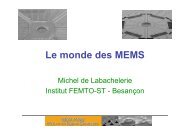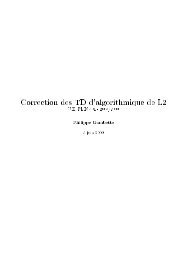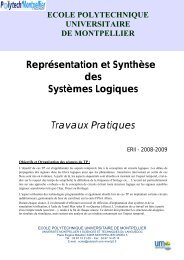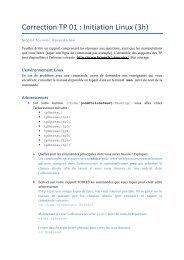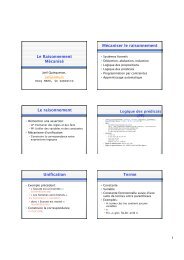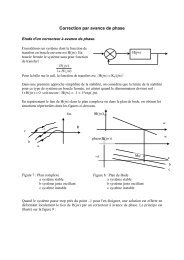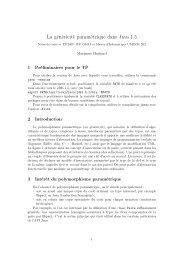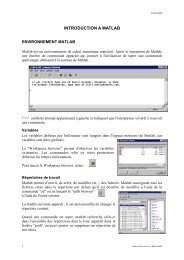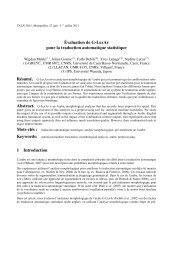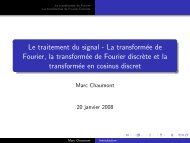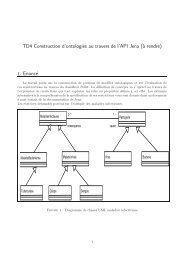Evaluating User Experience in Games: Concepts and Methods - Lirmm
Evaluating User Experience in Games: Concepts and Methods - Lirmm
Evaluating User Experience in Games: Concepts and Methods - Lirmm
You also want an ePaper? Increase the reach of your titles
YUMPU automatically turns print PDFs into web optimized ePapers that Google loves.
154 K. Poels et al.<br />
If we apply this reason<strong>in</strong>g to digital gam<strong>in</strong>g as one particular k<strong>in</strong>d of perceptual<br />
stimulation, we could assume that for habitual players of digital games, real-world<br />
perceptions, cognitions, <strong>and</strong> actions will be partly structured by their repeated exposure<br />
to the game environment. This means, habitual players use their knowledge<br />
from the game environment when perceiv<strong>in</strong>g <strong>and</strong> <strong>in</strong>terpret<strong>in</strong>g real-life environmental<br />
stimuli. We expect that long-term postgame experiences can be established<br />
through this process. These postgame experiences can relate to all k<strong>in</strong>ds of environmental<br />
stimuli, such as objects, situations, sounds, <strong>and</strong> words. Moreover, their<br />
impact can presumably affect various affective, cognitive, <strong>and</strong> behavioral processes.<br />
Examples could be seen <strong>in</strong> the context of objects <strong>in</strong> the real world that are associated<br />
with objects from the game world, sounds or songs heard <strong>in</strong> real life that trigger<br />
lively memories of a game world, <strong>and</strong> language <strong>and</strong> expressions used <strong>in</strong> the game<br />
world that show up <strong>in</strong> everyday vocabulary. We expect the concrete manifestation of<br />
these long-term postgame experiences to depend on the type of game or game genre<br />
one is repeatedly engag<strong>in</strong>g <strong>in</strong>. This means, frequent players of First Person Shooter<br />
games will probably experience different th<strong>in</strong>gs, make other associations, <strong>and</strong> use<br />
other game-related slang, compared to habitual players of Massively Multiplayer<br />
Onl<strong>in</strong>e Role Play<strong>in</strong>g <strong>Games</strong> (MMORPGs). To the best of our knowledge, there has<br />
not yet any research been carried out to <strong>in</strong>vestigate the existence <strong>and</strong> conditions of<br />
these specific k<strong>in</strong>ds of postgame experiences. In this chapter, we present a focus<br />
group study that was specifically designed to explore concrete manifestations of<br />
long-term postgame experiences.<br />
9.3 Focus Group Explorations<br />
The focus group method is a qualitative research tool that is frequently used <strong>in</strong> social<br />
sciences to explore people’s mean<strong>in</strong>gs, ways of underst<strong>and</strong><strong>in</strong>g, <strong>and</strong> experiences of<br />
a complex phenomenon (Lunt <strong>and</strong> Liv<strong>in</strong>gstone 1996). S<strong>in</strong>ce there is not yet much<br />
documented about postgame experiences, the current focus group studies aimed at<br />
explor<strong>in</strong>g the nature, the diversity, <strong>and</strong> the occurrence of particular postgame experiences.<br />
Given various <strong>in</strong>dividual differences with respect to play styles or motivations<br />
to play games (Yee 2006, Bartle 1996), we further wanted to provide <strong>in</strong>-depth, contextual,<br />
<strong>and</strong> motivational <strong>in</strong>sights <strong>in</strong>to the specific experiences of different types of<br />
gamers. We present two focus group studies: one directed at short-term experiences<br />
<strong>and</strong> the other prob<strong>in</strong>g long-term postgame experiences.<br />
9.3.1 Explor<strong>in</strong>g Short-Term Postgame <strong>Experience</strong>s<br />
We def<strong>in</strong>ed short-term postgame experiences as experiences that occur immediately<br />
<strong>and</strong> directly related to a specific game session. The ma<strong>in</strong> objective of this study<br />
was to explore firsth<strong>and</strong> verbalizations of how gamers feel or what they experience<br />
directly after they stopped gam<strong>in</strong>g.



